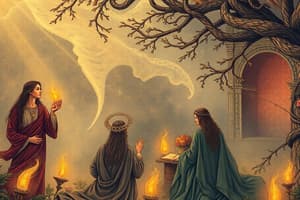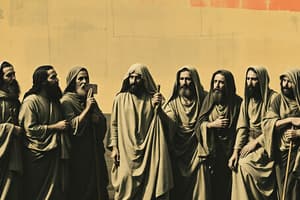Podcast
Questions and Answers
In the parable of the wicked tenants, what do the tenants ultimately do to the landowner's son?
In the parable of the wicked tenants, what do the tenants ultimately do to the landowner's son?
- They celebrate his arrival and offer him gifts.
- They pay him a reduced portion of the crop.
- They plot to kill him, mirroring their treatment of the servants. (correct)
- They ignore his presence and continue their work in the vineyard.
What is the primary symbolic representation of the vineyard in the parable?
What is the primary symbolic representation of the vineyard in the parable?
- The Promised Land given to the Israelites. (correct)
- The teachings and laws given by God.
- The hearts of the Jewish people.
- The physical temple in Jerusalem.
What does the landowner's act of sending his son demonstrate in the parable?
What does the landowner's act of sending his son demonstrate in the parable?
- His ultimate act of desperation and surrender.
- His forgiveness of the tenants' past transgressions.
- His expectation for the tenants to obey him directly. (correct)
- His desire to establish a personal relationship with the tenants.
Who are the 'other tenants' who will take over the vineyard at the end of the parable?
Who are the 'other tenants' who will take over the vineyard at the end of the parable?
What is the significance of the tenants' repeated rejection of the landowner's messengers?
What is the significance of the tenants' repeated rejection of the landowner's messengers?
Flashcards
Wicked Tenants Parable
Wicked Tenants Parable
A story illustrating the rejection of Jesus by religious authorities through the actions of tenants in a vineyard.
Symbolism of the Landowner
Symbolism of the Landowner
Represents God in the parable of the wicked tenants, reflecting divine authority and justice.
Symbolism of the Tenants
Symbolism of the Tenants
Represents Jewish religious authorities who reject Jesus and his message in the parable.
Symbolism of the Servants
Symbolism of the Servants
Signup and view all the flashcards
Symbolism of the Son
Symbolism of the Son
Signup and view all the flashcards
Study Notes
The Parable of the Wicked Tenants
- Jesus uses the parable of the wicked tenants to criticize the Jewish religious authorities.
- A landowner plants a vineyard and leases it to tenants.
- Servants are sent to collect the harvest, but are mistreated and even killed.
- Eventually, the landowner sends his son, who is also killed.
- The landowner is God, the tenants are the Jewish religious authorities, the servants are the Old Testament prophets, and the son is Jesus.
Key Message
- The parable highlights the authorities' rejection of Jesus.
- It symbolizes God's anger at the way the authorities mistreated his servants (prophets).
- It shows God's determination to punish those who oppose Him.
Studying That Suits You
Use AI to generate personalized quizzes and flashcards to suit your learning preferences.




